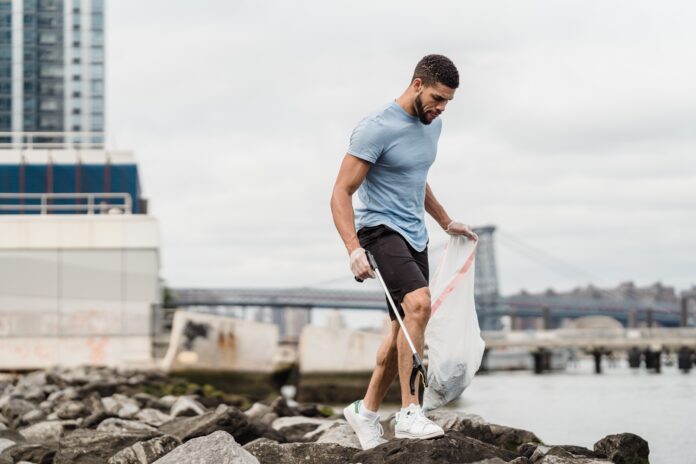
By
Fifty-one years ago in 1972, a young politician named Joe Biden headed to the only HBCU in his state — Delaware State University — to announce that he was running for United States Senate.
Given the longstanding dedication to environmental stewardship at the roughly 6,200-student land-grant research university, perhaps the young people there helped inspire now-President Biden to pick up the torch of climate justice.
“Our theme this year is responsible and responsive citizens,” Gulnihal Ozbay, a professor and extension specialist in natural resources at Delaware State, tells Word In Black.
On campus, being environmentally responsible doesn’t mean lecture-y, doom-and-gloom-style events.
To engage its Gen-Z demographic, this year, Delaware State hosted a popular spring festival that included a community garden clean-up and a tree scavenger hunt. The school also encouraged folk to grow gardens, conserve water, and reuse items.
Students Committing to Climate Justice
Other HBCUs are also coming through when it comes to raising up the next generation of students who care about climate justice.
Travel an hour and a half south of Delaware State, and you’ll see that students and faculty at Bowie State University in Bowie, Maryland, are deeply committed to climate justice. This year, the 4,000-student HBCU, located on the outskirts of Washington, D.C., began celebrating Earth Month at the end of March.
Students like junior Demetrius Briscoe, chair of the Green Ambassadors, a climate justice-focused student group on campus, think about the state of the environment year-round.
“Climate change started with colonization,” Briscoe says.
The United Nations agrees with him. Its 2022 International Governmental Panel on Climate Change report listed colonization as a contributor to the climate crisis.
However, despite the role of colonization in starting our climate crisis, Briscoe champions the idea that HBCUs have a responsibility to end it.
That’s why increasing student involvement at Bowie State — and across the HBCU diaspora — is a priority for one of Briscoe’s mentors, Jabari Walker, a sustainability and energy coordinator at the school.
“HBCUs should encourage small environmental clubs to form and allow them to grow,” Walker says.
Green Ambassadors, which Walker founded in 2014, is one such initiative. Through the club he encourages students like Briscoe to get more involved with climate justice — and take action.
HBCUs should encourage small environmental clubs to form and allow them to grow.
JABARI WALKER, BOWIE STATE
“In February, we teamed up with the local NAACP Maryland State Conference chapter. We went to Annapolis and met with a few legislators involving some of the bills that are being passed through the state legislature,” Walker says.
Making Change at an Institutional Level
Delaware State decided to push even harder for climate justice in 2009. That same year the school started its Go Green Initiative to cut energy costs.
“The goal is to make our campus more sustainable and to eliminate its contribution to global warming over time,” now-former Delaware State president Claibourne Smith said in a statement announcing the initiative.
“Our vision is that DSU’s Go Green initiative will be a model for all Historically Black Universities and Colleges,” Smith said.
Then in 2011, the school became the only HBCU accredited as an arboretum by the ArbNet Arboretum Accreditation Program. Only one other HBCU — West Virginia State — has since received that recognition.
This year on April 21, Delaware State was once again recognized as a Tree Campus — the 12th consecutive year it has earned this distinction — due to meeting “five core standards for sustainable campus forestry.”
Those standards include “the existence of a Tree Advisory Committee, evidence of a campus tree-care plan, dedicated annual expenditures for its campus tree program, an Arbor Day observance, and the sponsorship of student service-learning projects.”
Fostering Climate Awareness in the Classroom
As of 2022, there were 30 HBCUs in all with environmental programs that equip students with the knowledge and skills they need to create solutions in their communities.
These HBCUs are training environmental scientists, innovators, and policymakers and teaching them about critical topics — like biofuels and renewable energy, sustainable agriculture, and habitat and species protection.
“As HBCUs, we need to prepare the next generation to keep our natural resources for future generations,” Ozbay said.
Students, faculty, and experts affiliated with HBCUs nationwide also come together at the annual HBCU Climate Conference, a gathering organized by Texas Southern University and the Deep South Center for Environmental Justice, an organization dedicated to decreasing environmental harm.
As HBCUs, we need to prepare the next generation to keep our natural resources for future generations.
GULNIHAL OZBAY, DELAWARE STATE UNIVERSITY
The ninth annual conference will be held in October, and the event’s website explains that the convening “brings together HBCU faculty and students, researchers, climate professionals and environmental justice and coastal community residents impacted by toxic facilities and severe weather events related to climate change in order to bridge the gap between theory and the experiential realities of climate change.”
As Briscoe says, “Black institutions around the world should be the ones stepping out on the forefront of climate justice. If you want to get involved, get ready to fight a big fight.”


